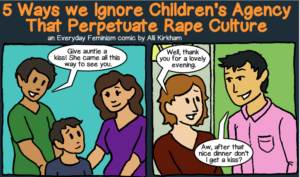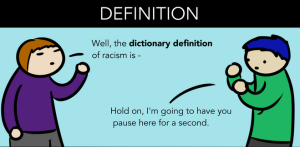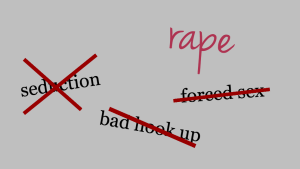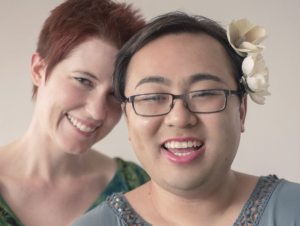
Source: About
Author’s Note: I use “women” and “girls” in some places here broadly, and is not meant in any way to exclude transgender men, genderqueer and agender people, as well as all others who do not identify as women, but do need access to abortions. It is imperative in our fight for reproductive justice that we use trans* inclusive language in our conversations about abortion.
A majority of states – 38, to be exact – require parental involvement in the decision of those under 18 to have an abortion.
Some states require notification of a parent, while others actually require a parent’s written consent. Some states require the involvement of one parent, while others require two, and some even require the parental consent to be notarized.
Although parental involvement laws add yet another barrier to abortion access for minors, these laws tend to be widely supported: According to a 2005 Gallup poll, 7 in 10 Americans favor laws that require women under 18 to get parental consent for any abortion.
And maybe that’s because on the surface, they seem well-intentioned.
If parents are notified about their child’s abortion, those parents may be able to provide the necessary support as their child makes this decision.
But what’s really the intention behind these laws? What kinds of effects do they have?
Let’s look at the following five reasons why parental involvement laws do far more harm than good, and why no one, regardless of age, should be legally required to obtain consent from their parents for an abortion.
1. They Are Yet Another Barrier to Abortion Access
When we talk about the threats to abortion access in the United States today, we’re not just talking about the possibility that Roe v. Wade (the Supreme Court case that legalized abortion) could be overturned.
We’re looking at a political and social movement that is chipping away at abortion access through legal measures that are intentionally making abortions more difficult, and for many, nearly impossible, to access.
From TRAP laws that have caused too many abortion clinics to close, to restrictions on gestational age that send many women traveling out of state, to mandatory ultrasounds, waiting periods, and “counseling” laws that unnecessarily burden and traumatize patients, parental notification and consent laws are yet another law that stands in the way of women and their legal right to an abortion.
These laws affect everyone, but they make abortion particularly hard for those already experiencing social and economic marginalization, like poor women, rural women, women of color, trans* and queer people, and girls/women under 18.
Although these laws have passed under the guise of “making abortion safer,” any mention of these laws being in the best interest of women is a flat-out lie.
These laws are passed with the full intention of making abortion more difficult to access, and together make up our country’s political and cultural assault on reproductive rights.
If a person under 18 is ”lucky” enough to live in a place that has an abortion clinic and has not been told repeatedly that having an abortion will cause God to hate her, that she’s going to hell, or that it will prevent her from ever having children in the future, she may decide to have an abortion (though even with this inundation of propaganda, many girls are smart enough to see through it and make a decision based on what is best for them).
On top of all of the rhetoric she may have experienced, she still has to figure out how to financially pay for an abortion, how to get out of school, and how to get to the clinic, and still, may have to maneuver the system that requires her to tell potentially unsupportive parents.
In the context of all the seemingly small barriers to accessing abortion, parental involvement laws can add a major obstacle for minors.
For some minors, it may just be a matter of having to tell parents that may not be very supportive of their decision; for others, it may mean being kicked out of their home or further exacerbating an already abusive home life.
Some minors may not be able to obtain consent from both parents, as they may not be living with or even be in contact with both parents. Even in a supportive family, the parental notification/consent process can be difficult.
2. Even with Alternatives, Parental Involvement Laws Can Threaten Young People’s Safety
Because there are many situations in which a minor cannot tell or receive consent from their parent(s), many states allow a judicial bypass, in which a minor seeks and receives court approval for an abortion without a parent’s knowledge or approval.
But accessing a judicial bypass in itself, similar to obtaining parental consent, can be yet another time-consuming and emotionally challenging barrier to accessing an abortion.
Obtaining a judicial bypass requires a minor to appear in court and present their case. They must show that they are informed and have full understanding of their decision to have an abortion, often also having to prove that they are mentally and emotionally stable enough to have an abortion.
Going to court is intimidating for most people and can be particularly scary and confusing for a minor who has never had to experience this before. Here, a person must stand before a judge explaining why she deserves something that is a legal right.
Whether one is obtaining notification, consent, or the judicial bypass, the process takes time, and because abortion procedures become more costly and complex with each passing week, parental involvement laws can lead to more costly and complicated later-term abortion procedures.
Obstacles such as this can also lead to desperation, especially for minors who are less likely to have access to necessary resources, and can cause a person to resort to dangerous, illegal options. It also leads many minors to travel out of state, to other states that have less restrictive parental involvement laws.
Ironically, while parental involvement is required for permission to obtain this incredibly safe procedure, neither parental involvement nor any kind of court approval is required for minors to decide to carry their pregnancy – a much riskier option in terms of health; First trimester abortions are 14 times safer than childbirth.
It is also interesting that 46 states, most of which have parental involvement laws for abortions, allow minors to place their child up for adoption without the involvement of their parents.
This is not to say that parental/court involvement should ever be required for childbirth or adoption, but these comparisons show a double standard in state laws, and make clear that these coercive laws are have no relationship to the actual health and safety of minors.
When we consider the safety of a person wishing to obtain an abortion, not only do parental involvement laws place minors at risk for more complicated procedures, but also for potentially difficult relationships and home lives as well.
3. Parental Consent Does Not Equal Parental Support
Parental involvement laws are framed in a way that assumes a certain level of support at home. The two-parent requirement assumes that a person actually lives or is in contact with both parents.
The laws assume that a minor’s parents are going to help their child make the right decision and that parents always have their child’s best interests in mind. But unfortunately, we know that we don’t live in that world.
And yet, only 16 of the 39 states provide exceptions for minors who are victims of sexual and physical assault, incest, or neglect, and they require a letter written by the minor describing the abuse, which then may be reported to the Department of Children and Family Services.
Even without state laws though, minors actually tend to tell their parents, and the younger they are, the more likely they are to seek parental support.
For those who do not tell their parents, they often have important reasons for not doing so. Nearly half of pregnant teens that have experienced abuse report being assaulted, most often by a family member, during their pregnancy.
Of those who did not tell their parents, 30% had experienced violence in their family or were afraid of being harmed or kicked out of their homes.
Many minors experience physical or emotional abuse, incest, and other unsafe situations that would be made much worse from parental involvement in their pregnancy/abortion.
Some are at risk of dealing with anti-abortion parents who will not allow them to have an abortion, or who will punish them, or kick them out, for doing so.
Even when the situation is not this extreme, having to tell parents about an abortion can cause a whole host of problems, and the decision of whether to tell parents (or anyone else, for that matter) should always be left to the person having the abortion.
4. They Feed a Culture That Teaches Girls They Do Not Have Ownership Over Their Bodies
Advocates of parental notification laws argue that they’re designed to protect women and girls from the supposed dangers of abortion. But this paternalism is sexist and ageist in its assumption that girls are not able to make decisions about their own lives and bodies.
When obtaining a judicial bypass, judges ask questions in order to determine whether an abortion is in their “best interest.” But who is the court, or even a parent, to decide that?
Girls are told throughout their adolescence that their bodies are not their own – from the oversexualization and objectification of girls’ bodies in the media to our culture’s obsession with purity, virginity, and slut-shaming, to the inaccessibility of real sexual health education in schools, girls aren’t given the information and agency they deserve.
Our culture tells girls not to have sex, but does not tell them how to prevent pregnancies. So when they wind up unintentionally pregnant, it is somehow shocking and shameful, a mark on their character, and they must then deal with the consequences.
Making this decision may be difficult, and by requiring parental consent, we are telling girls yet again, “Your body, your future, is not your own.”
Parental involvement laws are patronizing and are based on an unfounded and backwards dichotomy in which a minor may choose to have a child without notifying anyone, but must have parental permission to not to have a child. Does this really make sense?
Shouldn’t we be advocating that young women wait until their ready to have children? Even more, shouldn’t we be advocating in favor of young women’s bodily autonomy and their right to decide for themselves when they’re ready to be a mother?
5. Old Enough to Have a Child, But Too Young for an Abortion
Choosing to have a child has a larger impact on a person’s life than choosing to have an abortion.
It’s more of a burden financially, it’s more physically strenuous and dangerous to a person’s health, it carries far larger consequences on a person’s future, and it requires a certain amount of stability, emotionally and otherwise.
And yet, we do not require any kind of parental or court involvement before a minor can decide to carry a pregnancy to term.
When a minor is attempting to get a judicial bypass for an abortion, some states require judges to use specific criteria such as intelligence, stability, and knowledge of the procedure, maturity, and understanding of the consequences of having the procedure.
Thirteen states require “clear and convincing evidence” that an abortion is in the minor’s best interest.
What would happen if we required pregnant girls to obtain parental consent before carrying a child? What if the state gathered evidence to make sure that a person was mature and emotionally stable enough to have a child, that a person was fully aware of the “consequences” of this decision?
A minor in states with parental involvement laws is apparently old enough to decide to have a child but too young to decide not to have one. These states clearly favor one resolution over the other, and serve to restrict and coerce minors into making the choice that their legislators want them to choose, rather than the one that is best for them and their own lives.
Reproductive Justice Includes Girls
In our fight for reproductive justice, we have to stand up for the rights of people of all ages to make an informed decision about whether they want to carry a pregnancy to term or not.
Whether someone wants to have children or not should be completely up to the person carrying that pregnancy, as well as anyone else they want to involve.
Having a child – and having an abortion, for that matter – affects the pregnant person more than it does anyone else.
They’re the ones living with the results of this decision, and although in an ideal world, a young person would have the support of her family as well as her community in whatever choice she makes, we don’t live in that world.
We live in a world where a girl might have anti-choice parents, and although she isn’t ready to have a child, her parents will not grant her the consent needed to have an abortion. We live in a world where young people are abused by their caregivers and may even be pregnant as a result of this abuse.
We live in a world that does not respect the choices of young people – especially when it comes to sexuality and reproductive health.
We must stop supporting parental involvement laws as if they have any kind of positive effect on the choices of girls. We have to stop ignoring the fact that girls have sex and that they need access to birth control and abortion just as adults do.
Instead of setting up more barriers for young people to access reproductive health services, we need to work on making information about safer sex, birth control, and abortion readily available to them. We need to find ways to provide support for young people as they make decisions that will affect the rest of their lives, regardless of political views, gender, and age. We must recognize agiesm and sexism in laws that seek to control decisions around healthcare.
And most of all, we need to stand with girls and include them in the fight for reproductive justice.
***
To find out more about the parental involvement laws in your state, check out this Guttmacher chart.
The process of obtaining a judicial bypass is slightly different in each state. If you are interested in obtaining one, speak with a clinic – many abortion clinics will help you through the process and connect you with a lawyer and the application process.
You can call the National Abortion Federation referral line at 1-877-257-0012 or the financial assistance hotline at 1-800-772-9100 for more information about the parental involvement laws and the judicial bypass process in your state.
There also a few great advocacy groups that serve to help minors through the process:
Illinois Judicial Bypass Coordination Project
Women’s Law Project – Pennsylvania
[do_widget id=”text-101″]
Laura Kacere is a Contributing Writer for Everyday Feminism and is an feminist activist, social justice organizer, clinic escort, and yogi living in Washington, D.C. Laura coordinates the Washington Area Clinic Defense Task Force, teaches yoga with the intent of making it accessible to all, and does outreach for the DC-based sex worker support organization, HIPS. When she isn’t on her mat or at the clinic, she’s usually thinking about zombies, playing violin, eating Lebanese food, and wishing she had a cat. Follow her on Twitter @Feminist_Oryx. Read her articles here.
Search our 3000+ articles!
Read our articles about:
Our online racial justice training
Used by hundreds of universities, non-profits, and businesses.
Click to learn more




















